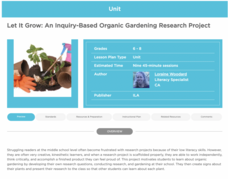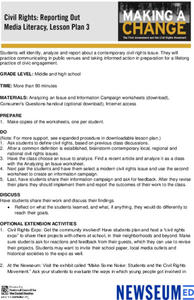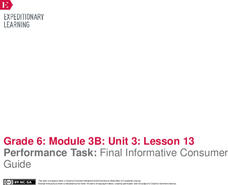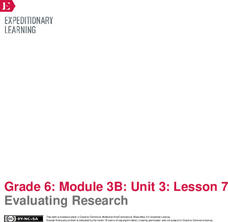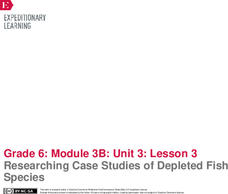Curated OER
Story Telling through Photography
Use this writing and photography lesson plan in your descriptive writing unit. Elementary and middle schoolers write and create a story line incorporating photos from Inspiration or their own personal photos. They experiment with...
Curated OER
All's Well for Stem Cells
By exploring the latest research on cell and tissue renewal your young scientists can understand the various internal body parts and systems examined in these studies.
K20 LEARN
Unlocking Answers: Keys to Great Research
Successful searches for information require more than just a device with Google access. Young researchers learn how to use keywords and hashtags, as well as how to evaluate sources and how to paraphrase without plagiarizing in a fun...
Overcoming Obstacles
Gathering Information and Making the Commitment
Scholars create and commit to a contract for their Service Learning project. The contract details who is responsible for which tasks on the action plan they developed in a previous lesson plan.
Overcoming Obstacles
Using Appropriate Resources
A lesson dives deep into reference materials. The class begins with a discussion of which resources are best used for specific purposes and how to identify ways to get the needed information. Learners share information about the internet...
ReadWriteThink
Persuasive Essay: Environmental Issues
Young environmentalists learn how to craft a persuasive essay about an environmental issue they consider important. After studying the components of a persuasive essay and examining a student model, writers brainstorm possible topics and...
ReadWriteThink
Let It Grow: An Inquiry-Based Organic Gardening Research Project
How does your garden grow? An inquiry-based, organic gardening unit asks young scientists to research a vegetable or flower, create an environment for it, and then plant and tend to the seedling. Gardeners develop their own research...
Bonneville
Informative Writing: Where Does Energy Come From?
Get energized about all the different sources of energy. A research project has scholars investigate a renewable or non-renewable energy type of their choice. They write a report on their findings and decide on a way to publish their work.
Newseum
Civil Rights: Reporting Out
After brainstorming a list of contemporary local, regional, and national civil rights issues, pairs of scholars select one of these issues and design an information campaign to spread awareness of the issue.
Newseum
Civil Rights: Chronicling the Movement
Scholars investigate events in the civil rights era in their community and develop a multimedia presentation of their findings. They compare local events with national events discussed on a NewseumED timeline.
Bonneville
The Problem of Plastic Trash Islands
Trash collection can be a hassle, especially out in the ocean. The second of four parts in the Adrift in a Sea of Plastic unit has pupils research plastic trash islands in marine ecosystems. They investigate why they occur and potential...
California Department of Education
My Dream Career
After completing an interest assessment, scholars discover a list of careers that appeal to their interests. They choose one to research and present their findings to their peers.
EngageNY
Performance Task: Final Informative Consumer Guide
Formative feedback should be kind, specific, and helpful. Pupils engage in a peer editing process, using a rubric to critique a partner's writing. Next, scholars use the feedback to create the final version of their informative consumer...
EngageNY
Revising the Informative Consumer Guide: Sentence Structure, Transitions, and Works Cited
Transitions are the glue that link paragraphs together. Pupils listen to a mini lesson plan on sentence structure and transitions and use what they learned to revise their informative consumer guides. Next, they self-assess their writing...
EngageNY
Analyzing the Features of an Informative Consumer Guide
Analyze, strategize, synthesize! Scholars analyze informative consumer guides to determine what features to include in their own guides. Next, pupils select charts and images to use in their guides.
EngageNY
End of Unit Assessment: Drafting the Informative Consumer Guide
Not all sandwiches are edible. Scholars use a Quote Sandwich graphic organizer to draft the written content of their informative consumer guides. Additionally, they view a mini-lesson on formal writing.
EngageNY
Planning Content of Informative Consumer Guide: Sustainable Fishing Methods
There's no such thing as over-planning. In preparation for their informative consumer guides, scholars complete a Quote Sandwich graphic organizer to compile their information about sustainable fishing methods. Next, volunteers share...
EngageNY
Planning Content of Informative Consumer Guide: The Issue of Overfishing and Fish Depletion
Let's get organized! Pupils organize the information they have gathered about overfishing into a Quote Sandwich graphic organizer in preparation for their informative consumer guides. Next, they engage in a pair share activity to discuss...
EngageNY
Evaluating Research
Calling all archaeologists! Scholars dig through their research about overfishing, searching for the best information to include in their consumer guides. Next, pupils engage in a pair-share activity to discuss their findings with a...
EngageNY
Mid-Unit 3 Assessment, Part 2: Explaining How New Information Connects to the Topic
Let's talk it out. Using the resource, scholars work in triads to discuss how their research has deepened their understanding about sustainable fishing. Next, pupils engage in a whole-class discussion to consider their next steps toward...
EngageNY
Mid-Unit 3 Assessment Part 1: Researching Information about Buying Fish Caught Using Sustainable Methods
Sustainable seafood is not an oxymoron. Pupils watch a video about how consumers purchase seafood responsibly. Then, using resources in their assessment research folders, they complete a graphic organizer to record factual information...
EngageNY
Researching Case Studies of Depleted Fish Species
There's something fishy going on in the ocean. Using the resource, scholars engage in a jigsaw activity, researching a case study of a depleted fish species. After completing their research, each triad partners with another group to...
EngageNY
End of Unit 2 Assessment: A Hosted Gallery Walk
Speak your mind. Scholars present their claims in groups of three. They use a presentation checklist as each member takes a turn. At the end of the lesson plan, pupils complete an End of Unit 2 Assessment: Presenting a Claim and Findings...
EngageNY
Presenting a Research-Based Claim: Visual Aid and Peer Critique
Back to the drawing board. Scholars work on the visual to complement their claim presentations using the Criteria for the Cascading Consequences Chart Visual as a guide. They then practice their presentations with partners.








